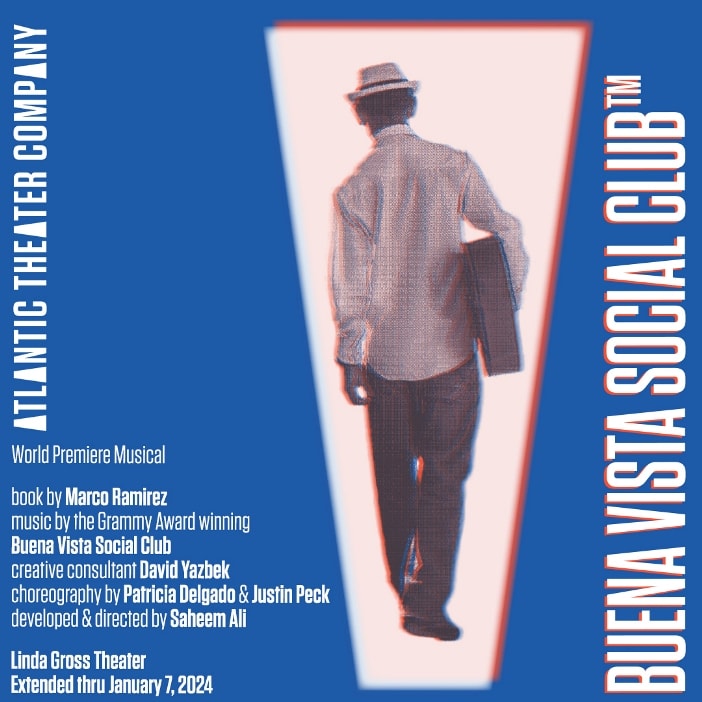Known as Cuba’s “Golden Age of Music,” the 1930s-50s were vibrant times in Havana, when nightlife was at its peak and nightclubs were pulsing with the sounds of the Afro-Cuban genres of son, bolero, and danzón, and charangas (traditional bands playing Cuban dance music) and conjuntos (small musical ensembles) played several sets a night, moving from one venue to another over the course of a week. It was also a period of segregated members-only social clubs, during a time of systemic discrimination against dark-skinned Afro-Cubans. Among the sociedades de negros (Black societies) was the Buena Vista Social Club, originally founded in 1932, in the Havana neighborhood of Buenavista, with its roots in a cabildo (a fraternity organized by African slaves in the 19th century), where members socialized, drank, and danced to live music. But the Cuban Revolution brought an end to the era and, in 1959, began a program to close the clubs, affecting the livelihood of many musicians, who were left out of work.
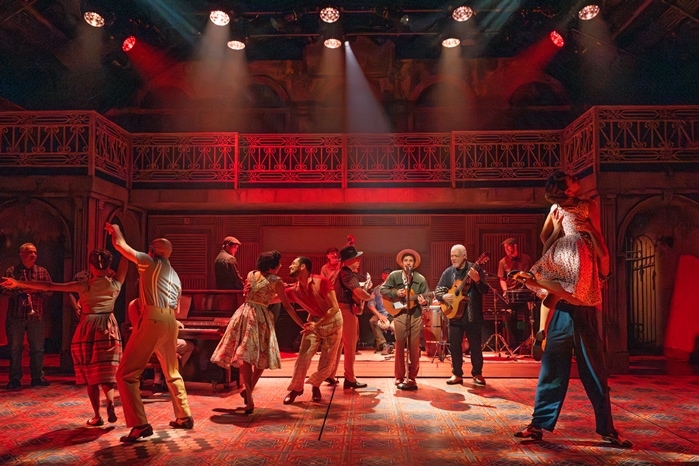
In 1996, a band of veteran musicians was brought back together to record an album of their songs, named after the popular club where they performed, which was released in 1997, and went on to become the best-selling world-music record of all-time. It also became the subject of a 1999 Oscar-nominated documentary of the same name by German director Wim Wenders, who captured the studio performance on film, along with interviews with members of the band, bringing new life and popularity to their music, immortalizing their songs, and inspiring the world-premiere musical Buena Vista Social Club, developed and directed by Saheem Ali, with a book by Marco Ramirez, and David Yazbek serving as creative consultant, now playing a limited Off-Broadway engagement at Atlantic Theater Company.
Framed in the context of the making of the studio recording, the show moves back and forth from 1996 to 1956, with short scenes in the format of a memory play interspersed between the dynamic performances of fifteen of the band’s original songs. Those include their signature son hit “Chan Chan” and standout danzón number “Candela,” played by thirteen masterful international musicians (David Oquendo, Renesito Avich, Gustavo Schartz, Javier Diaz, Mauricio Herrera, Román Diaz, Guido Gonzalez, Edward Venegas, Hery Paz, Leonardo Reyna, Jared Machado, and Julio Monge, conducted by music director and pianist Marco Paguia, who also provided the orchestrations and arrangements, with additional arrangements by Diaz and Oquendo), with the top-notch ensemble (Skizzo Arnedillo, Angélica Beliard, Carlos Falú, Héctor Juan Maisonet, Ilda Mason, and Marielys Molina) and members of the featured cast dancing, moving, and swaying – as does the audience, in their seats and in the aisles – to the stirring Latin rhythms (choreography by Patricia Delgado and Justin Peck). While the songs don’t advance the plot in the traditional sense of a musical, they set the style and mood and generate the energy and excitement of the show.
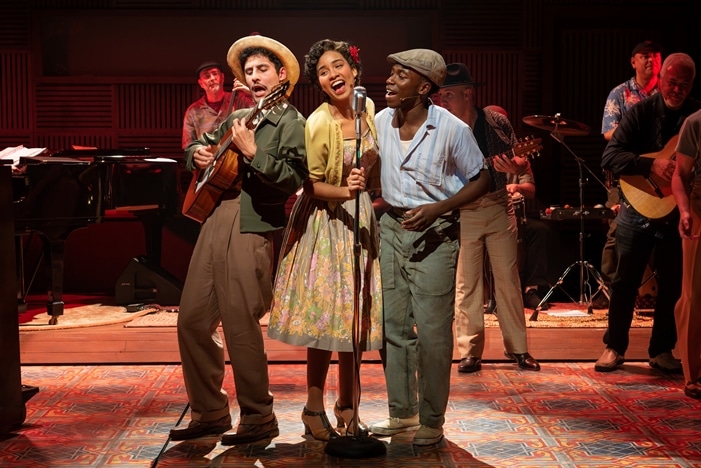
At the center of the thinly fictionalized real-life story is the demanding Omara Portuondo, the only female member of the Buena Vista Social Club, who, during the recording of the album, reflects on her life and career, her estrangement from her sister Haydee, by whom she was groomed and booked to perform their duets at the upscale tourist hotels of the city, and her preference to sing at the titular club with the talented Afro-Cuban Ibrahim, denied access to the white venues of the ‘50s (and whom she encounters again in 1996, singing on the streets for donations by passersby). She, and some of the other main characters, are seen as both their younger and 40-year-older selves, as portrayed by two different actors.
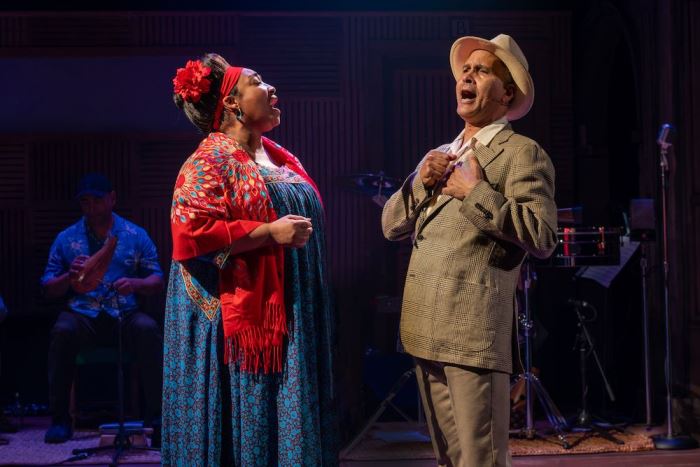
Natalie Venetia Belcon brings expressive emotion and voice to Omara in the ‘90s, with the excellent Kenya Browne as the rising young singer, who harmonizes beautifully with Haydee (Danaya Esperanza), until they angrily part ways, never to work together or to see each other again, when she chooses to remain in revolutionary Cuba, despite her sister’s appeal to escape with her to safe haven in the US – a separation for which the more mature and wiser Omara is ultimately sorry. Olly Sholotan and Mel Semé embody Ibrahim’s wholehearted love of music, who happily played the club with the young and accomplished Compay Segundo (Jared Machado) and Rubén González (Leonardo Reyna), and in the studio with them (Julio Monge as the older Compay and Jainardo Batista Sterling as Rubén) four decades later.
Rounding out the cast are Renesito Avich as musician Eliades Ochoa and Luis Vega as director Juan de Marcos González. While not all of the characters are fully fleshed out in the script or given a backstory, each has a moment to shine and, most significantly, to impart the spirit of sincere dedication to preserving the music and culture of Havana. And there are some segments of balletic and Neo-Expressionist dance, which, to me, were unnecessary anachronisms that distracted from the authentic music and feelings, which speak for themselves.
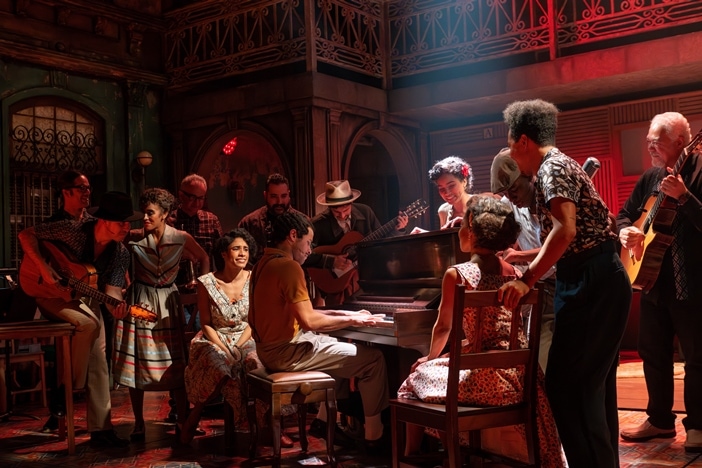
A transporting bi-level architectural set by Arnulfo Maldonado evokes the Spanish Colonial look and feel of mid-century Havana, with a low platform stage for the musicians, movable tables and chairs, microphones, and an upright piano on wheels that easily transition to the changing locales of the recording studio and clubs, home and street, enhanced with Tyler Micoleau’s lighting (brighter for the studio, darker for the nightclubs) and sound by Jonathan Deans. Dede Ayite’s costumes, and hair, wigs, and make-up by J. Jared Janas, likewise capture and distinguish between the stylings of the ‘50s and the ‘90s, in perfect keeping with, and visually accentuating, the music and dance.
If you’re not already a fan of Afro-Cuban music, Buena Vista Social Club is sure to make you one; don’t miss it.
Running Time: Approximately one hour and 55 minutes, including an intermission.
Buena Vista Social Club plays through Sunday, January 21, 2024, at the Atlantic Theater Company, performing at the Linda Gross Theater, 336 West 20th Street, NYC. For tickets (priced at $125, including fees), go online.


